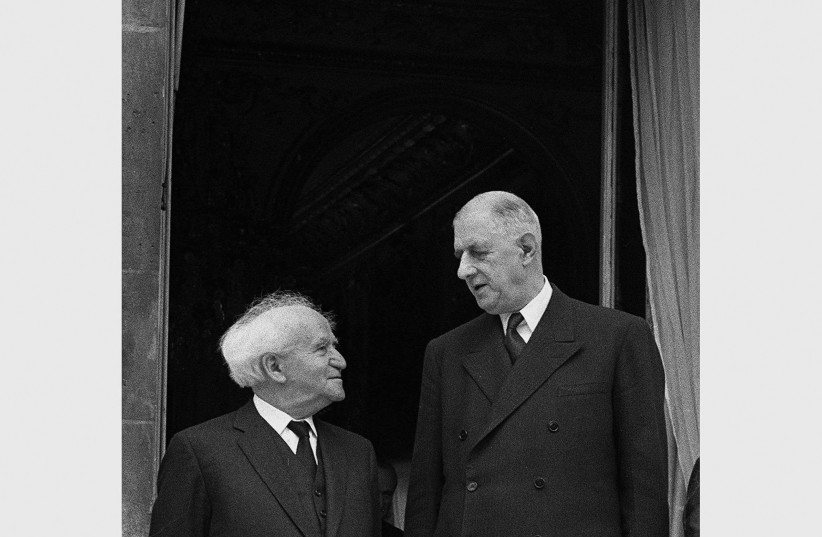A few days back, French President Emmanuel Macron called for an arms embargo on Israel in a bid to push the Israeli government to find a political solution to the ongoing war. France is not a major arms supplier for Israel. In 2023, France exported military equipment merely worth 30 million euros (US$33 million) to Israel. According to the SIPRI report, 99% of Israeli arms imports are from the USA and Germany. The French fatwa may be morally upsetting but is not likely to have any consequence on Israel’s war-fighting ability.
The situation, however, does evoke a sense of déjà vu.
Back in 1967, just three days before the Six-Day War, French President Charles De Gaulle had announced an arms embargo on Israel. Prepaid orders of Mirage fighter jets were canceled. De Gaulle wanted to realign with the Arab world, which had started to boycott France for its support of the Jewish state since the 1950s. The real damage happened two years later. On 3 January 1969, a second arms embargo was imposed by France after the Israeli attack on Beirut airport. Without the French connection, Israel felt cornered and helpless.
Besides building a special relationship with France – which became the largest arms supplier to Israel, the Israeli leadership started developing the domestic military industry in its early days. However, the seriousness of the indigenous capability came about in the late 1960s with DeGaulle’s policy shift.
Similar embargoes were imposed by the US and UK in 1971 and 1973, respectively, further pushing Israel to spearhead its military modernization program. By the end of the 1970s, Israel had the capability to produce advanced military equipment ranging from tanks and jet aircraft to precision-guided smart weapons, microelectronics, and rocket-propelled engines for sea-to-sea and air-to-air missiles. The IDF had achieved a high degree of technological superiority.

Advanced technology makes Israel strong
IN HIS 1997 ESSAY on force construction, Maj.-Gen. (ret.) Isaac Ben-Israel argued that “the more the war between us and the Arabs is conducted at a higher technological level, the better our relative situation will be.” Israel’s wars with its adversaries were essentially a case of “few against many,” and the leadership realized that the preferred scenario for them was a hi-tech war. Besides modernizing its military arsenal, bolstered by military aid from its biggest ally – the US, the IDF also underwent a technological facelift.
The IDF began building its cyber capabilities in the 1990s. Over the years, advanced cyber surveillance techniques and AI were employed to support and execute their ground operations. Specialized units such as MI’s Technological Unit 81 or Signals Intelligence Unit 8200 are known to have conducted some of the most sophisticated intelligence operations on foreign lands. The story does not end there. Israel created a unique knowledge-sharing model wherein the veterans of these specialized units were allowed, rather encouraged, to set up tech unicorns and cyber start-ups after leaving the IDF. By the turn of the century, Israel came to be known as the start-up nation and a technological marvel.
Now, IDF has its own new cyber defense training school – Basmach Maslul Alpha in Beersheba, under the Israel National Cyber Directorate, to mold youngsters into tech wizards. After graduation, these young techies are posted with technological units across the armed forces. Israel is harnessing the potential of its young, bright minds as well as the experience of veterans to its benefit, like no other country does. This unique civilian-military synergy changed the IDF of the pre-1990 era into the hi-tech, advanced military that the world knows today. From De Gaulle to Macron, Israel has come a long way.
Divya Malhotra has been associated with India’s National Security Advisory Board as a researcher. Tal Pavel is an IDF veteran and founder-director of CyBureau, Tel Aviv.
